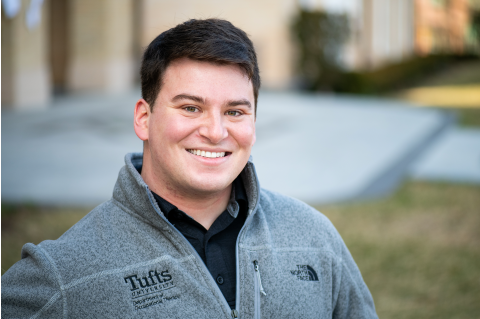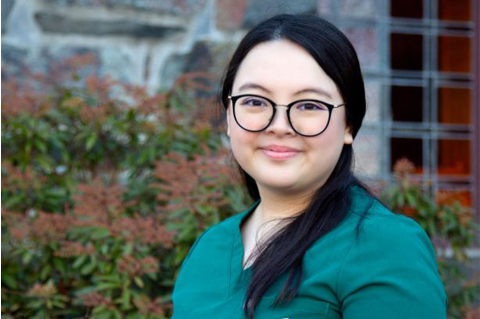Occupational Therapy: Entry-Level Occupational Therapy Doctorate
Spring: n/a
Summer: Oct 15
Overview
The Entry-Level Occupational Therapy Doctorate (ELOTD) is for students entering with a degree in a field other than OT. As a student, you will experience an exciting program combining a diverse curriculum, research, service learning, and fieldwork.
Program Outcomes
Tufts Department of Occupational Therapy (also known as the historic Boston School of Occupational Therapy‚ founded in 1918) has one of the country's top-ranked programs. Through education, research, and practice, we promote participation in meaningful activity of individuals, communities and populations with diverse needs and experiences.
As a student in the ELOTD program, you'll develop into an occupational therapist with a passion for civic engagement who is able to address the current and future occupational needs of individuals, populations, communities and health care systems.
As a graduate of the ELOTD program, you are eligible to sit for the NBCOT exam.
Application Requirements
- ELOTD applicants use the OT Common Application (OTCAS) to apply
- Application Fee
- Resume/CV
- Personal Statement: Please use the OTCAS prompt
- Kira Assessment: Starting in 2023, all applicants will complete virtual asynchronous interviews using the Kira Assessment platform. This will be linked directly from your application.
- GRE General Test scores are not required for applicants who have a degree from an accredited U.S. institution by time of enrollment. GRE scores are required for applicants who received a degree from an institution outside of the U.S.
- Official TOEFL, IELTS, or Duolingo English Test, if applicable
- Transcripts
- Three Letters of Recommendation. Preference is to include at least one academic reference. Note: Only 2 letters of reference are required for current Tufts University undergraduate and certificate students.
- Certificate of Hepatitis B Vaccination will be required upon acceptance/enrollment
Prerequisites
All prerequisites must be passed with a grade of B- or better and taken at an accredited college. We do not accept online or hybrid credit for any of our prerequisite course work unless a course was moved to an online format due to the COVID-19 pandemic:
- One course in abnormal psychology or psychopathology
- One course in human/lifespan development (will accept a course in the area of child development or developmental psych)
- One general course in the area of psychology, sociology, anthropology
- One course in human cell based biology or human anatomy. At least one of your science prerequisites must contain a lab
- One course in human physiology. When anatomy and physiology are taken as a combined course, (A&P I and II) you must be take both courses to fulfill our physiology prerequisites.
- One course in introductory statistics
Note: Entry-level OTD applicants apply through OTCAS.
Please contact Jill Rocca, Occupational Therapy Admissions Coordinator, if you have any questions about the application process.
Tuition & Fees
GSAS bills tuition using a per-credit billing model, meaning you are billed for the number of credits you take each semester. This billing model is used to provide students better flexibility so they may "pay-as-they-go".
| Tuition* | $1,270 per credit |
| Total Credits Required | 106 |
Estimating Tuition Costs for this Program
This example pathway outlines estimated tuition costs per semester using a typical full-time course load. This is one possible pathway to completion; actual credits, costs, and degree completion time may vary based on a student’s course load.
| Full-Time Pathway | Summer | Fall | Spring | Total |
| Year 1 | 11 credits | 15 credits | 14 credits | 40 credits |
| $13,970 | $19,050 | $17,780 | $50,800 | |
| Year 2 | 9 credits | 19 credits | 17 credits | 45 credits |
| $11,430 | $24,130 | $21,590 | $57,150 | |
| Year 3 | 9 credits | 6 credits | 6 credits | 21 credits |
| $11,430 | $7,620 | $7,620 | $26,670 | |
| Estimated Total Tuition Before Aid* | $134,620* | |||
Note: this example does not account for any scholarships that may be awarded at the time of admission. GSAS offers generous merit- and need-based tuition scholarships for qualified applicants. A list of funding opportunities is provided below.
*Estimated based on 2025-2026 tuition rates. Rates are subject to change each academic year. For further information about the full cost of attendance, including health insurance, fees, and estimated indirect costs (housing, transportation, etc.), visit Student Financial Services.
Financial Aid & Funding Opportunities
At Tufts University, we believe that every qualified applicant should have the opportunity to pursue graduate study, regardless of financial circumstances. We are committed to helping you navigate the financial aspects of your education and strive to make graduate school accessible through a variety of support options.
Scholarships and Awards Available for this Program
- Merit- and need-based tuition scholarships for master’s programs: To be considered, be sure to indicate your interest within the Financial Aid section of your application.
- The Future Leaders Fellowship is a full-tuition scholarship for outstanding full-time master’s students and entry-level OTD students. Future Leaders Fellows are selected by the GSAS Dean following their admittance to Tufts.
- The Bekenstein Family Endowment Scholarship Award is given to occupational therapy students who have demonstrated a trajectory for leadership in the profession of occupational therapy, strong academic standing, and financial need.
- City Year Corps members, alumni, and staff are eligible to receive a minimum scholarship award of 25% off tuition.
Work Opportunities and Awards
- There are various graduate assistantships and work opportunities available for Graduate students across Tufts.
- The Graduate Student Open Access Publishing Fund provides financial support to students who want to publish their work open access.
- The Graduate Student Research Competition provides funding for expenses including equipment, materials, and supplies; research participant compensation; and expenses of travel to conduct research.
- The Graduate Student Conference Reimbursement Fund is available for students to travel to present or attend at a conference or professional meeting.
Visit our Graduate Financial Aid page for information on loans and financing options.
Student Spotlights
Combining Creativity and Care
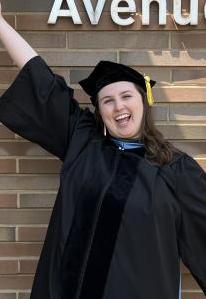
Tufts really supported me in undertaking projects that aligned with my interests and goals. I’m a pretty confident person, but when you’re entering a new profession it’s easy to get intimidated. Having the opportunity to engage in a doctoral experiential component, fieldwork placements, and present at conferences gave me the confidence and knowledge base to start my career off strong and provide the highest level of care I can to children and their families.
Kaitlyn Irwin, OTD ‘22
Faculty

Nancy Baker

Nancy Baker
Research/Areas of Interest: Chronic Pain, Virtual Reality, Musculoskeletal Health, Ergonomics Nancy Baker's research focuses on ways to mitigate musculoskeletal pain, so people with chronic pain can increase their participation in everyday life. She focuses on three pain mitigation pathways: 1) workstation ergonomics to address work environment properties that propagate pain; 2) improving care delivery in CTS; and 3) virtual reality (VR) as a therapeutic medium for pain. Baker's research is eclectic and uses a variety of tools and techniques to answer her research questions. A new area for her, her current research examines how to implement VR into clinical practice. Here pilot work has looked at what types and dosages of VR are most effective, how different diagnoses, such as chronic back pain or osteoarthritis, respond to VR, and she has partnered with rehabilitation centers to trial different implementation practices. So far, her research consistently demonstrates that VR has a significant effect on pain and that it can be feasibly done by practicing therapists. Some results found a carryover of effect past the immediate VR session. Baker is also working with colleagues to examine new paradigms in carpal tunnel treatment and is completing a trial looking at dosage for standing desk use.

Janet Brooks

Janet Brooks

Jennifer Buxton

Jennifer Buxton
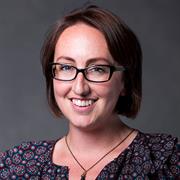
Meredith Grinnell

Meredith Grinnell
Research/Areas of Interest: Current research interests include the use of tele-health technologies and patient participation in healthcare outcomes. Other interests include the use of social media to enhance engagement and communication within the profession as well as with patients.

Jessica Harney

Jessica Harney
Research/Areas of Interest: Rehabilitation Management, Evaluation and Treatment of physical dysfunctions, Evaluation and Treatment of Orthopedic Dysfunctions in the Athlete, Concussion Management and Education, Adaptive Sports as a Rehabilitation Tool Adaptive Sports, Concussion Management of the Athlete and Student, Professional development of the Health-Care Manager

Margaret Morris

Margaret Morris
Research/Areas of Interest: Board Certification in Pediatrics (BCP) 2012-2022, American Occupational Therapy Association Occupational therapy evaluation and intervention in pediatrics, particularly contextual and strengths-based services Pediatrics Evaluation, including strengths-based evaluation, occupation-based evaluation, context & environment Intervention, including models of occupation-based service provision, contextual services, collaboration, strengths-based, least restrictive environment Program development, including systems approaches, strengths-based, mindfulness, social-emotional regulation, physical literacy Teaching and Learning Models of professional development, andragogy, self-regulated learning Project-based learning, technology in teaching and learning, using visual analog scales in course evaluation, concept mapping Online teaching and learning, course design (F2F, hybrid, online)
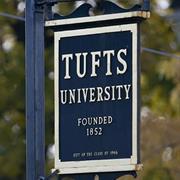
Monica Pessina

Monica Pessina
Research/Areas of Interest: Design and analysis of outcome based studies in the acute care setting, and the quantitative analysis of hand function after injury.

Brynn Speroni

Brynn Speroni
Research/Areas of Interest: Brain Injury, Neurological Disorders, Substance-Use Community Programming, Occupational Therapy in Post-Secondary Education, Evaluation and Treatment of Physical & Cognitive Dysfunction, Rehabilitation in Inpatient Settings, Rehabilitation Management, Fieldwork

Elizabeth Whitney

Elizabeth Whitney

Ryan Whitney

Ryan Whitney
Research/Areas of Interest: Complex medical pediatric occupational therapy, fieldwork education, professional communication, professional development of emerging occupational therapists, interprofessional collaboration, community-based practice
